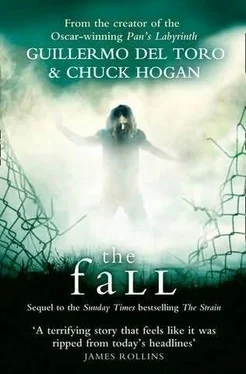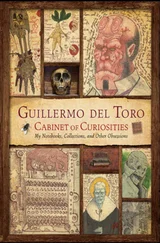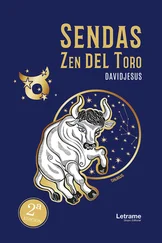“I see.”
“I, of course, can accept no responsibility for what became of these crooked sellers. Though I must say, Mynheer Blaak’s interest in the volume is keen, because he has paid half of my commission on every unsuccessful transaction. In order that I might continue my search and keep potential suitors arriving at his door, so to speak.”
The broker casually pulled out a pair of fine white cotton gloves and fitted them over his manicured hands.
“If you will forgive me,” said Setrakian, “I did not journey to Amsterdam to walk its beautiful canals. I am a superstitious man, as I stated, and I should like to unload myself of the burden of such a valuable book at the earliest convenience. To be frank, I am even more concerned about robbers than curses.”
“I see, yes. You are a practical man.”
“Where and when will Mynheer Blaak be available to conduct this transaction?”
“The book is with you, then?”
Setrakian nodded. “It is here.”
The broker pointed to the twin-handled, twin-buckled portmanteau of stiff, black leather in Setrakian’s hand. “On your person?”
“No, much too risky.” Setrakian moved the suitcase from one hand to the other, hoping to signal otherwise. “But it is here. In Amsterdam. It is near.”
“Please forgive my boldness then. But, if you are indeed in possession of the Lumen then you are familiar with its content. Its raison d’être, yes?”
Setrakian stopped. For the first time he noticed they had wandered off the crowded streets and were now in a narrow alley with no one in sight. The broker folded his arms behind his back as if in casual conversation.
“I do,” said Setrakian. “But it would be foolish for me to divulge much.”
“Indeed,” said the broker. “And we don’t expect you to do so but-could you effectively summarize your impressions of it? A few words if you would.”
Setrakian perceived a metallic flash behind the broker’s back-or was it one of the man’s gloved hands? Either way, Setrakian felt no fear. He had prepared for this.
“Mal’akh Elohim. Messengers of God. Angels. Archangels. In this case, Fallen Ones. And their corrupt lineage on this Earth.”
The broker’s eyes flared a moment, then were still. “Wonderful. Well, Mynheer Blaak is most interested to meet you, and will be in contact very soon.”
The broker offered Setrakian a white-gloved hand. Setrakian wore black gloves, and the broker certainly felt the crooked digits of his hand as they shook-but, aside from an impolite stiffening, did not otherwise react. Setrakian said, “Shall I give you my local address?”
The broker waved his gloved hand brusquely. “I am to know nothing. Monsieur, I wish you every success.” He was starting away, back the way they came.
“But how will he contact me?” asked Setrakian, after him.
“I know only that he will,” the broker responded over a velvet-lined shoulder. “A very good evening to you, Monsieur Pirk.”
Setrakian watched the dapper man walk on, long enough to see him turn in toward the window they had passed and knock pleasantly. Setrakian turned up the collar of his overcoat and walked west, away from the inky water of the canals toward the Dam Platz.
Amsterdam, being a city of canals, was an unusual residence for a strigoi, forbidden by nature to cross over moving water. But all his years spent in pursuit of the Nazi doctor Werner Dreverhaven, the camp physician at Treblinka, had led Setrakian into a network of underground antique booksellers. That, in turn, had put him on the path to the object of Dreverhaven’s obsession, this extraordinarily rare Latin translation of an obscure Mesopotamian text.
De Wallen was known more for its macabre mix of drugs, coffee bars, sex clubs, brothels, and window girls and boys. But the narrow alleys and canals of this port city were also home to a small but highly influential group of antique book merchants who traded manuscripts all over the world.
Setrakian had learned that Dreverhaven-under the guise of a bibliophile named Jan-Piet Blaak-had fled to the Low Countries in the years following the war, traveling throughout Belgium until the early 1950s, crossing into the Netherlands and settling in Amsterdam in 1955. In De Wallen, he could move freely at night, along paths proscribed by the waterways, and burrow undetected during the day. The canals discouraged his staying there, but apparently the lure of the bibliophile trade-and the Occido Lumen in particular-was too seductive. He had established a nest here, and made the city his permanent home.
The middle of the town was island-like, radiating from the Dam Platz, surrounded in part, but not bisected by, the canals. Setrakian walked past three-hundred-year-old gabled buildings, the fragrance of hash smoke wafting out the windows with American folk music. A young woman rushed past, hobbling in one broken heel, late for a night of work, her gartered legs and fishnet stockings showing beneath the hem of a coat of faux mink.
Setrakian came upon two pigeons on the cobblestones, who did not alight at his approach. He slowed and looked to see what had captured their interest.
The pigeons were picking apart a gutter rat.
“I am told you have the Lumen? ”
Setrakian stiffened. The presence was very near-in fact, right behind him. But the voice originated inside his head.
Setrakian half-turned, frightened. “Mynheer Blaak?”
He was mistaken. There was no one behind him.
“Monsieur Pirk, I presume?”
Setrakian jerked to his right. In the shadowy entrance to an alleyway stood a portly figure dressed in a long, formal coat and a top hat, supporting himself with a thin, metal-tipped cane.
Setrakian swallowed his adrenaline, his anticipation, his fear. “How did you ever find me, sir?”
“The book. That is all that matters. Is it in your possession, Pirk?”
“I… I have it near.”
“Where is your hotel?”
“I have rented a flat near the station. If you like, I would be happy to conduct our transaction there-”
“I am afraid I cannot travel that far conveniently, for I have a bad case of the gout.”
Setrakian turned more fully toward the shadowed being. There were a few people out in the square, and he dared to take a step toward Dreverhaven, in the manner of an unsuspecting man. He did not smell the usual earthy musk of the strigoi, though the hash smoke acted on the night like a perfume. “What would you suggest, then? I would very much like to conclude this sale this evening.”
“And yet, you would have to return to your flat first.”
“Yes. I guess I would.”
“Hmm.” The figure ventured forward a step, tapping the metal toe of its cane on a cobblestone. Wings fluttered, the pigeons taking flight behind Setrakian. Blaak said, “I wonder why a man traveling in an unfamiliar city would entrust such a valuable article to his flat rather than the security of his own person.”
Setrakian switched his portmanteau from one hand to the other. “Your point?”
“I do not believe a true collector would risk allowing such a precious item out of his sight. Or his grip.”
Setrakian said, “There are thieves about.”
“And thieves within. If indeed you want to relieve yourself of the burden of this cursed artifact for a premium price, you will now follow me, Pirk. My residence is just a few paces this way.”
Dreverhaven turned and started into the alley, using the cane but not reliant upon it. Setrakian steadied himself, licking his lips and feeling the bristles of his disguising beard as he followed the undead war criminal into the stone alleyway.
The only time Setrakian was allowed outside Treblinka’s camouflaged barbwire fences was to work on Dreverhaven’s library. Herr Doktor maintained a house just a few minutes’ drive from the camp, workers transported there one at a time by a three-man squad of armed Ukrainian guards. Setrakian had little contact with Dreverhaven at the house, and, much more fortunately, no contact with him whatsoever inside the camp surgery, where Dreverhaven sought to satisfy his medical and scientific curiosity in the manner of an indulged boy left alone to cut worms in half and burn the wings off flies.
Читать дальше
Конец ознакомительного отрывка
Купить книгу












